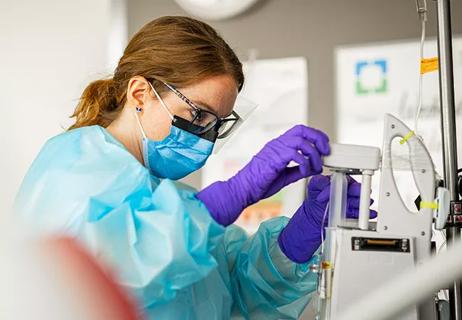First-of-kind study aims to enable prevention of brain disorders before symptoms appear
Cleveland Clinic has launched a landmark study to better understand the mechanisms of neurological diseases, with the goal of pinpointing disease biomarkers early, well before clinical symptoms manifest.
Advertisement
Cleveland Clinic is a non-profit academic medical center. Advertising on our site helps support our mission. We do not endorse non-Cleveland Clinic products or services. Policy
The new Cleveland Clinic Brain Study — the largest clinical study ever for brain disease — will prospectively collect data from up to 200,000 neurologically healthy individuals over a 20-year period to identify brain disease biomarkers and targets for preventing and curing neurological disorders.
“One in every six people around the world has a neurological disease,” says Andre Machado, MD, PhD, one of the study’s three co-principal investigators and Chair of Cleveland Clinic’s Neurological Institute.
“Disrupting neurological diseases is one of the greatest challenges of our time and motivates our clinicians and scientists every day,” he continues. “By launching a study of this magnitude, we have the potential to discover causes of neurological disorders and what happens before symptoms become obvious — the silent phase. Our hope is to change the course of neurodegeneration, with the long-term goal of curing diseases in their earliest stages, years before symptoms are even seen. We can make neurological care better for the next generations.”
The population-based longitudinal study is an enterprise-wide undertaking, enlisting a multidisciplinary team of physicians and scientists from across Cleveland Clinic’s global health system. The study launched at Cleveland Clinic’s main campus in Cleveland and will expand to additional Cleveland Clinic sites over time.
In the study’s first five years, researchers will enroll 10,000 volunteers who will be examined and thoroughly investigated. Volunteers will be adults 50 years or older with no known neurological disorder or neurologically healthy adults age 20 or older who have a first-degree relative diagnosed with multiple sclerosis. These participants will then undergo regular assessments consisting of the following (all of which are assessed at baseline):
Advertisement
The resulting trillions of data points will be collected in a secure data repository of longitudinal medical information along with treatment outcomes data, as relevant. Using advanced computing tools, researchers will aim to identify clinical, imaging, neurophysiologic, cognitive, genetic, metabolomic, proteomic and microbiomic biomarkers that can serve as predictors of neurological disorders over time.
“We will be seeking ‘disease fingerprints’ to help guide diagnostic and preventive strategies,” Dr. Machado explains.
The study’s primary goals include the following:
Secondary goals for related future studies include development of preventive interventions for identified disorders, development of more-effective treatments to improve the course of these disorders and identification of methods to improve treatment outcomes.
Participants will remain in the study indefinitely, unless they choose to withdraw.
“By researching at-risk healthy individuals over the course of 20 years, we will learn what is happening to the brain and body before a neurological disease is diagnosed,” says co-principal investigator Imad Najm, MD, Director of Cleveland Clinic’s Charles Shor Epilepsy Center. “This research will help us understand the mechanisms of brain diseases and lead to the design of preventive treatments. This is precision medicine in its finest form, as we are building a foundation to screen one person at a time — potentially with something as routine as a blood test — to diagnose brain disease on the spot and prevent it from happening altogether.”
Advertisement
The researchers note that while dozens of large-scale biorepository studies are currently attempting to correlate genetics with disease, these databanks lack depth of phenotyping, particularly in terms of assessments relevant for neurological disorders. “Low-resolution big-data approaches can reveal factors that are associated with disease occurrence, but they are limited in the identification of pathological processes of the human brain prior to disease onset,” observes co-principal investigator Dennis Lal, PhD, MS, of Cleveland Clinic’s Genomic Medicine Institute. “We are positioned to develop the first-ever highly curated and phenotyped dataset of undiagnosed, presumably healthy individuals as they progress toward either continued health or neurodegeneration.”
More information on the Cleveland Clinic Brain Study is available at clevelandclinic.org/brainstudy.
Advertisement
Advertisement

Study identifies Ketorolac as a potential repurposable drug

The relationship between MTHFR variants and thrombosis risk is a complex issue, but current evidence points to no association between the most common variants and an elevated risk

One-time infusion of adenovirus-based therapy is designed to restore heart muscle function

Cleveland Clinic researchers receive $2 million grant from the National Institutes of Health

New Cleveland Clinic fellowship fosters expertise in the genetics of epilepsy

Integrates genetic and clinical data to distinguish from GEFS+ and milder epilepsies

Advanced genomic research techniques show potential to treat a variety of conditions

TNFRSF1B gene variant associated with slower progression, offering potential drug target